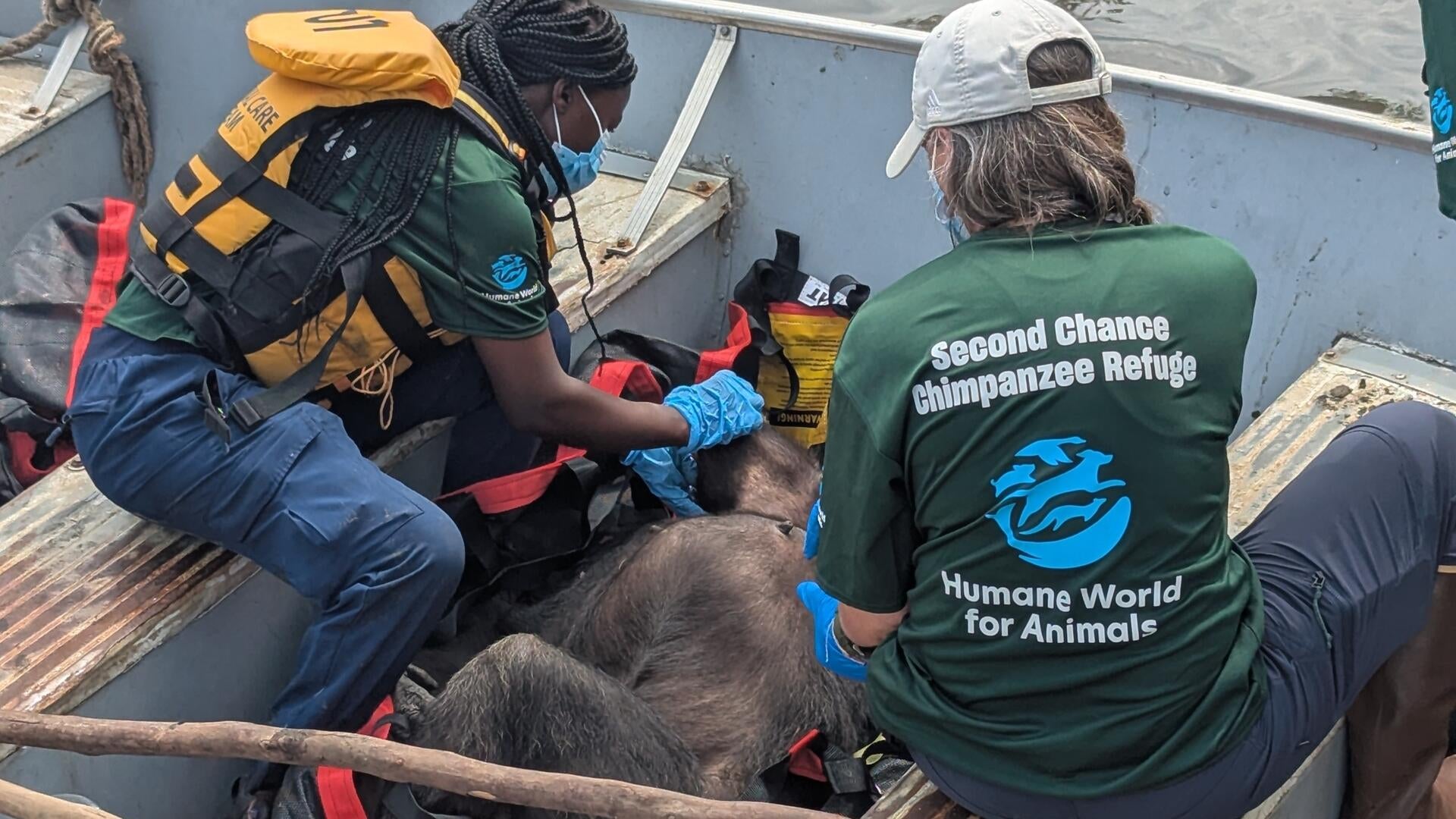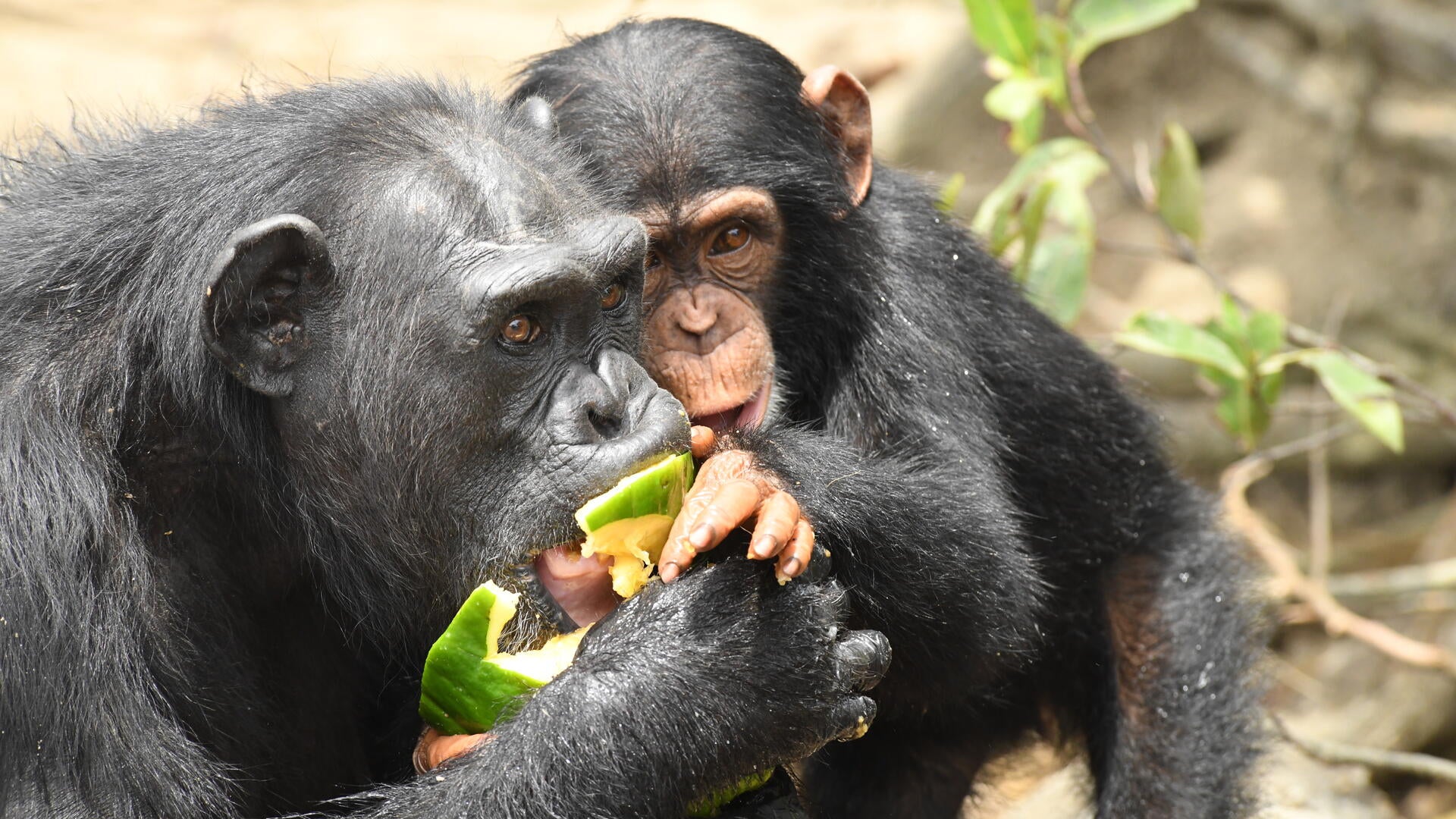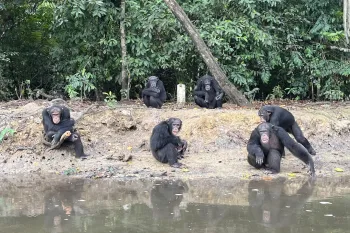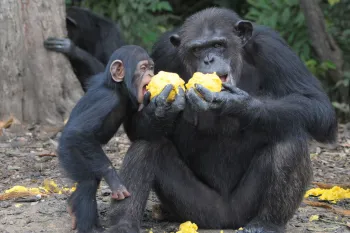One morning earlier this month, six chimpanzees at our sanctuary in Liberia received a special mango treat. Inside was a sedative to help Bean, Kowura, Hannie, Denyon, Will and Goofie relax before being tranquilized for a journey by boat to their temporary chimp villa on the mainland. In the days leading up to this strategic breakfast, primate experts from Uganda, the United Kingdom and the United States joined our own team at Second Chance Chimpanzee Refuge to help us safely transport these animals.
After their boat ride, our expert staff helped the chimps get settled at their villa on the mainland, so that we can start to build a new structure back on their island home for health check-ups and extreme weather sheltering. The chimps will be moved back to their island once the upgrade is completed later this year.

Humane World for Animals
This happy improvement is the latest development in a story that goes back to 1974, when hundreds of chimps were rounded up from the wild or the pet trade and put into a laboratory in Liberia by a research company based in the U.S. For three decades, these chimps—including many of our 61 sanctuary residents—would be held in this barren laboratory and used in invasive hepatitis B and blood cleansing experiments.
During that time, the lives of the chimps intersected with the human crises facing the region. From 1989 to 2003, two civil wars in Liberia claimed the lives of many of the chimpanzees because their dedicated caretakers were unable to reach them, or they were killed by militias. Those who survived then, in 2015, contended with another threat to their survival—their abandonment after the laboratory closed and moved them to six estuary islands. Throughout all these years of civil war, the Ebola crisis and finally the laboratory pulling funding for their care, the dedicated caretakers risked their lives to continue caring for the chimps.
It was only thanks to the devotion of local caretakers that the animals were able to survive in the face of so much adversity. In 2018, Humane World for Animals made a life-long commitment to the chimps. To this day, we and our amazing team in Liberia care for these incredible primates at the refuge where they live a near-wild existence on their forested islands, while we also lead campaigns to transition from harmful animal experiments to modern, animal-free methods so that scientific progress doesn’t rest on the backs of animal suffering.
Caring for these chimps is the kind of work that our staff has called “a calling.” A number of our sanctuary team have cared for the chimps since their laboratory days, staying on when we created Second Chance Chimpanzee Refuge so that they could see these remarkable chimps get to live the life they deserve. Now, they are helping to usher in the next exciting phase in the growth of the sanctuary.
Ben Johnson, senior animal caregiver at Second Chance Chimpanzee Refuge, originally cared for the chimps when they were at the laboratory in the 1980s and has stayed with them ever since. “I have known most of these chimps for their whole lives,” Johnson said, “so this was a special day for me personally and professionally. I am so happy we were able to move them safely for the upgrade, but I am even more excited for when we can return them back to their island home. They have been through so much hardship in their lives; it feels like a privilege every day that we get the chance to put that right by letting them live free and wild at this very special sanctuary.”
Dr. Richard Ssuna, Humane World for Animals’ veterinarian and director of Second Chance, explained that this “was a huge operation involving more than a year of careful planning.” He added that the chimps are all settling in nicely at the temporary villa, and the new structure we’re building on their island home will make veterinary care and check-ups far easier.

Jamie Linder/Humane World for Animals
Bean, Kowura, Hannie, Denyon, Will and Goofie are just the first six to enjoy the villa while their island is being upgraded. Over the course of a few years, each island will undergo improvements, benefitting all the chimpanzees at the refuge. Already, these chimps live lives that mimic as closely as possible how they would live in the wild, roaming freely on the large, forest-covered islands; they build nests, harvest honey from forest bee hives, feed on leaves and wild berries, interact with smaller forest animals, and live in tightly knit social groups.
And the chimps are not the only beneficiaries of this magnificent refuge and its work. We support wildlife protection projects around the sanctuary, which maintains the forest ecosystem and keeps its wild inhabitants safe from logging, poaching and destruction. The refuge provides employment opportunities within the local community, purchases local fresh fruit and vegetables for the chimps’ daily food, and funds local initiatives, such as repairs to schools and roads. We also help fund local government agencies to search for wild primates at highway checkpoints who have been captured for bushmeat.
With all that these chimpanzees and their ancestors have been through, they are living testaments to the inextricable link between animal and human well-being. With our improvements to this special refuge for chimps, we are proving that once again eradicating cruelty and deprivation in favor of spreading compassion and care benefits us all.




